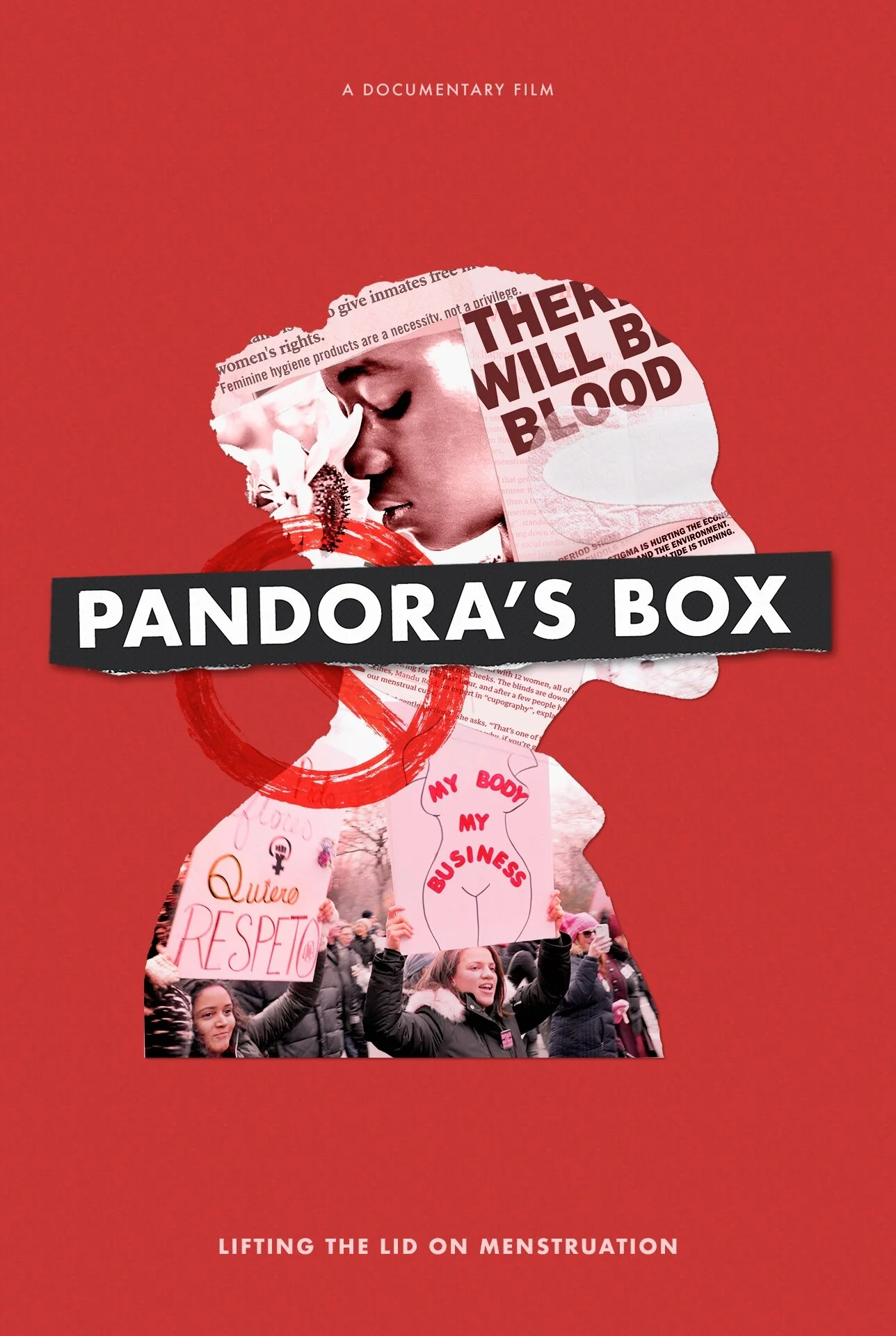Opening Pandora’s Box: Meet The Women Behind the First Feature-Length Menstruation Documentary
We are, finally, living in a cultural moment where women’s rights are being championed in louder voices than ever before. The integral part menstrual equity has to play in achieving gender equality is slowly but surely being recognised. Enter PANDORA’S BOX: LIFTING THE LID ON MENSTRUATION, a timely film exploring the ongoing battle for menstrual equity in all its forms. This documentary exposes the realities of countless women and girls who remain marginalised and denied the basic human right to menstruate safely, and elevates the fight being fought in courtrooms, on stages and in the streets to bring the menstruation conversation into the mainstream. After meeting the women behind Pandora’s Box at the film’s world premiere at the Whistler Film Festival, I reconnected with three of these female forces for some insight into their journey bringing this film into the world: Carinne Chambers-Saini, executive producer, CEO of Diva International and founder of DivaCares; director Rebecca Snow, and director of photography Sarah Thomas-Moffat.
Creating Re-usable Pads, India
From its earliest concept stages this film was destined to be a female-led project. With over a decade of experience in all things menstruation at the helm of Diva International, the organisation behind the menstrual cup we know as the DivaCup, Carinne Chambers-Saini has long been committed to tackling menstrual inequity. “The film came out of our commitment to menstrual equity - a movement which includes ensuring that menstrual products are accessible to all people, no matter what their financial circumstances. Once I started looking at the injustices people experience, it was like opening up a pandora’s box of discrimination, misinformation, isolation and abuse surrounding this natural bodily function. Once you are aware of period stigma and the devastating effects of period poverty, you can’t unsee it. So, there it was, our title: Pandora’s Box: Lifting the Lid on Menstruation.”
Canadian Screen Award-winning director Rebecca Snow told me she was hooked as soon as she was approached for the project. Prior to embarking on this project, she recalls, “I was shockingly unaware of the inequities and injustices surrounding access to menstrual products and education - and particularly surprised to learn that it is very much an issue in our own cities, where girls are skipping school because they lack supplies.” Carinne confirmed that the female-heavy make-up of the team was intentional. “I learned that it’s rare for women to comprise the majority of a film crew. To me, these women are a hugely untapped talent that we wanted to include in the project.”
I asked how working as a predominantly female film team impacted interviews with subjects, considering that discussing or even acknowledging menstruation is so taboo in some communities the team visited, including remote locations in India, Kenya and Uganda. “Having female camerawomen and sound recordists helped to create a safe space for our subjects to open up to us,” Rebecca writes. “I am very proud of the fact that I was surrounded by women on this film - it is usually the opposite. We heard some shocking stories about menstruating for prisoners in the US, the grim reality of menstruating while living in poverty the UK, and the effects of lack of menstrual education on girls in Africa and India. I don’t know how many of the interviewees would have felt comfortable talking about some of that stuff with a male crew.”
DP Sarah Thomas Moffat echoed the rarity of the experience of working with so many women on a film project. “Being one of so few young women working as a camera assistant years ago, I was always looking for other women to look up to - but there weren't any. That experience informed my voice and gave me the strength to speak up, to be the change I wanted to see.” But this conviction did not always serve her professionally. “At that time, this worked against me and I wouldn’t be hired as often as my male counterparts. I was negatively labelled a ‘feminist’ before it was cool.” Shooting Pandora’s Box was unique in terms of the openness with which menstruation was discussed: “We created an immediate empathy simply by being women. We also shared our own stories on the road about how menstruation has created difficulties for us. It was a deeply connecting tide of empathy on the journey among many women.”
The documentary goes the distance in exposing the myriad ways women and girls are marginalised because of the simple and inevitable occurrence of menstruation, from girls dropping out of school in Kenya to women being subjected to discrimination whilst menstruating in prison in America. The team pulls no punches in examining the stigma that weaponizes menstruation as a tool for female oppression in many patriarchal social structures.
Jennifer Weiss-Wolf, Women’s March in New York
The glaring injustices exposed in the film initially knocked me for six. However, the film’s grim exposé of the realities of menstrual inequity is tempered with insights from incendiary activists striving to bring the menstruation fight to those with the power to enact legislative change. Subjects include Jennifer Weiss Wolf, co-founder of Period Equity and author of Periods Gone Public: Taking a Stand for Menstrual Equity, and musician Madame Gandhi, who discusses her decision to run the London Marathon bleeding freely.
From lobbying US politicians for legislative reform to taking to the streets at the New York Women’s March, and with excerpts and insight from advocates spanning so many walks of life, it’s difficult to resist the inspiring call to action the film sounds. The narrative also recognises the important truth that periods impact people across the gender spectrum - eloquently articulated in the documentary by trans-gender model Kenny Jones.
I asked Rebecca and Carinne how they felt the film had been received by audiences so far. Rebecca reflected on her directorial decision to include male subjects in the documentary: “This is not just a film for women. We have some great interviews with male change-makers - people trying to even the playing field and come up with solutions - and some of the most impactful feedback we have had so far has been from male audience members. Shock, horror, remorse from so many men who had no idea this was even an issue, and had (not surprisingly) never considered the impact menstrual inequity has on gender inequality. I even had one guy issue a formal apology to me (as a menstruator!) for the role men have played in the oppression of women over menstruation. It was quite surprising! But great to know the film is hitting the right nerves.”
Pandora Box Team
Carinne recalls a realisation that struck her amidst the applause following the film’s first public screening in Whistler. “I remember looking at the audience and realizing that they were shocked by what they had just seen. Afterward, in the Q&A, so many of them asked how they could get involved to help. They could see how alarming it is that so many people are suffering due to cultural taboos and lack of access to both products and education. How unjust is it that women in prison are denied access to tampons and pads? How sad is it for some girls not to understand what a period even is before they menstruate? We were incredibly gratified by the audience response, and we hope to continue sparking this response around the world to advocate for change. We need to create a world where menstruation is a fact of life, not life-limiting.”
The candour of Pandora’s Box felt like a watershed moment in terms of normalising the openness so long overdue in conversations surrounding menstruation. It is a politically-charged and inspiring call to action, emphasising the distance we still have to go while still managing to ignite a potent, hopeful spark. As a feminist who is tired of the raised eyebrows and sidelong glances that all-too-often follow this identification, watching for the first time felt like releasing the most invigorating exhale I didn’t know I needed to let out. The film’s remarkable story, from its conception by a female CEO to a passion project shot on location in four continents and featuring subjects of a searing and singular dedication to their cause, is a luminary example of women in the creative industries bringing us art we didn’t know we needed and bolstering the potential power of women everywhere, period.
Pandora’s Box is currently on the film festival circuit. Visit the website to view the trailer, and stay tuned for updates and screenings near you via @pandorasbxfilm on Instagram, Facebook and Twitter.3









